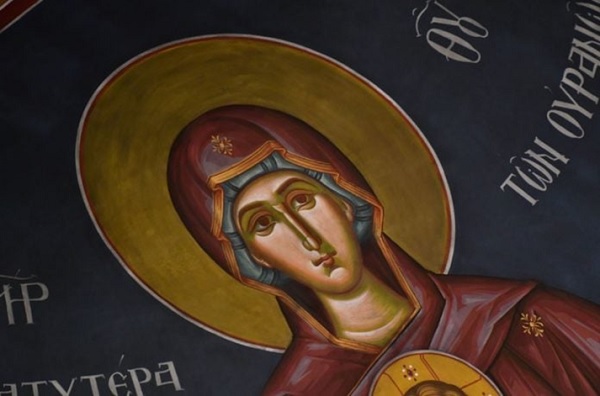1st Salutations
3 March 2023‘I shall open my mouth and it will be filled with praise and I shall pour out words to the Queen and Mother; I shall be seen radiantly keeping the festival and shall joyfully sing her wonders’ (irmos, ode 1, Akathistos Hymn).
As the voice of the Church and of us, also, the holy hymnographer tells us that he’ll sing, he’ll shout, about Our Lady, who is the Queen and Mother. This means, in the first place, that his words don’t express merely his own sentiments and his personal faith, but the faith and sentiments of all the members of the Church (in any case, there isn’t anything individual in the Church).

And what will he say about our Lady? What words will his mouth express that will also be our own? Obviously not something rough and ready- something that might suit the devious practices of this duplicitous world. And also no human reflections, no matter how wise they may be, since they’d be detailing some philosophy or ideology which have been superseded by the revealed word of God. He notes that his words will be those of the Holy Spirit: ‘I shall open my mouth and it will be filled with the Spirit’. As the Prophet and King, David, says: ‘Lord, you will open my lips and my mouth will show forth your praise’ and this is the same as is expressed in the Spirit by the hymn-writer. Because no-one among all our saints is praised to the same extent as Our Most Holy Lady, the Mother of God. You might say that only apostles or prophets have the right to express themselves regarding our Lady.
The reason for this is that our Lady alone, the loveliest flower of the whole of humankind, was given the grace by God to become the Mother of the Lord, so that the sight of her reveals faith in her Son and God (the Mother of God and our Lord Jesus are always seen together). This is why only those eyes which have been transformed by the Holy Spirit can see her properly, as for example, happened in the case of Elizabeth, the mother of Saint John the Baptist, after the Annunciation: ‘Elizabeth was filled with the Holy Spirit and cried in a loud voice: “Blessed are you among women”’. You have to be a Spirit-bearer to see our Lady as our Lady.
Looked at in this way, the kind of Christians we are is revealed before the Unique one: are we Orthodox or heretics? Our Lady’s the criterion of Orthodoxy. Those who slight her or, even worse, take her name in vain, aren’t so very far removed from the Jews at the time of our Lord, who also condemned her with the most unmentionable curses. Those who, such as the Protestant heretics, claim that she’s a woman like any other also make clear their heresy. On the other hand, those like who, like the members of the Latin Church, pay excessive honor to our Lady and raise her to the level of the divinity, display the deviation towards the right, in terms of delusion. For the Orthodox, however, she is our All-Holy Lady, that is, above all the saints, but still human. She’s full of God’s grace, but never exceeds human limitations. In the person of our Lady, we see the prospect for the human race: we can be deified, in the sense of uniting ourselves with the Lord, while yet remaining human.
The hymn-writer concludes: we rejoice and are glad that, in this situation, the Spirit of God gives us the words to speak about our Lady. We can’t call to mind our Lady and not be glad in our soul, not be filled with joy. Because in her we see the excess of God’s grace, which is the overflowing of his love and hers, transformed into her constant, wonderful interventions for our sake. And grace is always joy. It’s only the devil who scowls and burns at the mere mention of her name.
Every time we congregate to commemorate our Lady, we show that we, too, are enveloped in the Spirit of God. To a greater or lesser extent, the grace of the Holy Spirit enables us to gaze upon the face of the Mother of God: in Church, where we’re spiritually united. We have a double responsibility: to retain this grace, that is we must always be ready on its behalf; and to strive always to increase it. Both retention and increase of God’s grace, which our lady richly enjoyed and enjoys, means that we must always submit to God’s will. ‘Behold, the hand-maiden of the Lord, may your will be done in me’, as our Lady said. This should be our own answer to any invitation or challenge which God addresses to us at any time in our life.






